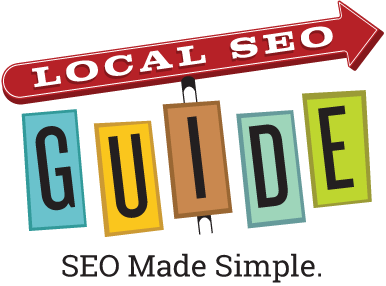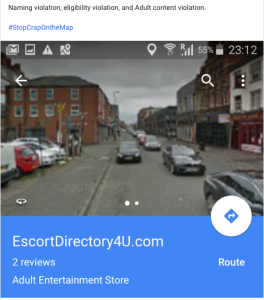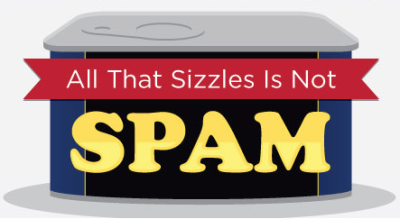There has been a big push by some in the local search space to have Local SEOs vigorously engage in reporting “spam” on Google Maps/Google My Business.
The GMB profiles in question are ones like this:
Per the screenshot, they are violating Google’s guidelines with their name and by breaking the no adult content rule and thus are eligible to be removed if reported.
This is something that I find very interesting, for a few reasons:
- I don’t think it’s spam
- It highlights some of the differences between SMB/Enterprise Local SEO
- It mixes burdens on what SEOs are obligated to do
- Google has a rich tradition of playing SEOs against each other
- Better guidelines enforcement is not in the top 3 of my own GMB want list
It’s Not Spam
I’ve always taken issue with calling violations of Google’s guidelines (including GMB guidelines) spam. At worst it’s a ToS (Terms of Service) violation, which until recently, so was jailbreaking my phone. Spam is something that is unwanted, and generally illegal, which I don’t think Google guidelines violations are. Sure, it’s unwanted to Google, but as an end user do I really care if a plumber is violating Google’s guidelines? Personally, I don’t, I only care i they can provide the service I’m looking for. Something that actually harms the end user is something like hijacking thousands of hotel listings, etc. This, to me, is spam.
Here is a thought experiment for you all. According to the federal government, medical/recreational marijuana dispensaries are illegal. Per GMB guidelines, anything that is illegal is a guidelines violation. Would you really report businesses like these?
And while we are talking about violating Google’s ToS, everyone who is reading this blog post likely does so (or pays someone who is doing so) several times a day. As @methode reminded everyone yesterday, scraping Google products is a ToS violation. That means your rank trackers, your competitive intelligence tools, and any in-house tools you use to scrape a Google product are essentially violating Google’s guidelines. Yet this is something that we as an industry don’t have a problem with, likely because it benefits all of us.
It’s Not Relevant for All Local SEOs
Industries that suffer from having manipulated listings in local packs are often in verticals that are dominated by SMBs. This illustrates a really interesting divide in the Local SEO community that is rarely talked about. Most Local SEO practitioners work with SMBs, so if they specialize in a vertical like home services or lawyers, their can be a pervasive problem with guideline violations. In these instances guidelines violations can have a serious impact on clients performance. So, in this scenario, it makes total sense to report a guidelines violating profile as your client can potentially see an immediate positive impact.
However, if you work with multi-location brands, or verticals without lots of listings that are violating GMB guidelines (restaurants etc) then it’s likely a very poor use of your time and your clients budget to wade into this battle.
Just as an example, we have both SMB and multi-location clients in the moving vertical. Guideline violations can be a huge problem in this space. For our SMB clients, who for arguments sake have 1-9 locations, it makes a ton of sense to invest some time reporting businesses that rank ahead of them in local results and are violating GMB guidelines.
However, if I were to go to one of our multi-location clients and tell them I was going to use some of their budget to remove listings that violate Google’s guidelines, they should fire me on the spot. It would take significant labor hours to do something like that over hundreds of locations and the benefit would be negligible. Instead we could be working on link building, or solving other multi-location Local SEO problems that would be more beneficial to the client, and their locations holistically. Which leads me to my next point…
It Mixes Burdens
Honestly, this is Google’s problem. And it’s a problem that they have because they don’t invest enough resources in the local product. That is just not my problem, unless it’s a client’s problem. My job is not improving Google’s products so that it’s easier to sell ads (and turn a profit), and quite frankly if Google cared about garbage GMB/Maps listings they would turn down the dial on the ~1.5 positions a business is likely to rank if they have their keyword in their business name. There may be times where one of Google’s guidelines is not in my client’s best interest, and in those moments I feel like I am ethically obligated to my client and not to Google.
Google FUD
Google’s relationship with SEOs has always been relatively antagonistic, and full of FUD. For those new to the space I highly recommend reading Aaron Wall’s early warning about the disavow tool. It seems pretty clear to me that Aaron was right. Now Google is saying that Penguin devalues links and there is no need for a disavow, you should still submit them so $GOOG can see what you think is “spam”. Just to be clear, I don’t think Google’s bad, and I don’t think people like Matt Cutts or Gary Illyes are bad actors. Quite the opposite actually, but that doesn’t mean when it comes to search all our ships are sailing in the same direction. Also, I am happy to delete this post if someone at $GOOG wants to send me a Pixel + Home + WiFi 🙂
So, WTF does this have to do with Local SEO and guidelines violations? It’s pretty simple, the more Local SEOs report listing violations, the more Google can remove the ability to influence Google My Business. This is bad for everyone as we all get paid to improve clients rankings, often in Google My Business. The big G isn’t interested in some esoteric better web, I mean they may be, but they have a fiduciary responsibility to their shareholders as a publicly traded company to keep the revenue moving up and to the right. Local is already an obvious monetization path for them, the big problem is making the results sensical so that brands will be willing to invest in paid GMB/Maps. Fine, paid advertising in local SERP features is inevitable, but I’m more concerned with them improving the existing product in a way that benefits all of my clients (as you should be as well)…
Better Enforcement of Guidelines Isn’t a Top 3 Want
Let’s just look at a handful of things I would want improved on GMB/Maps before better enforcement of guidelines:
- Aggregate GMB Insights for Bulk Accounts – This is a no brainer #1. Even if it’s best to be skeptical of 3rd party data sources it would be amazing to have this data aggregated in bulk accounts. It seems likely that we will be able to do this in future versions of the API, but really this should have happened years ago.
- Bulk Accounts for Service Area Businesses – Enough with ignoring SABs already. There are companies that have to manage dozens, hundreds, even thousands, of locations without a bulk account. This is just absurd. SABs have long been neglected by the Google Local product team and that really needs to change.
- Re-jiggering The Local Ranking Algo – As I mentioned earlier, a business is likely to rank ~1.5 positions higher if it has their keyword in the business name. It’s this kind of poor ranking factor that fuels these guidelines violations in the first place. If the dial on this factor were turned down, it would likely benefit the clients of white hat Local SEOs while at the same time cutting down on the value of guideline manipulation.
tl;dr
Sometimes it might be worth it to report GMB guideline violations, and sometimes not. As SEOs, we should always grapple with what our relationship with $GOOG is, and how far we trust/support them. We should always do what’s best for our clients, and that isn’t always the same for everyone.





8 Response Comments
Hey Dan,
I just wanted to clarify that the #StopCrapOnTheMap hashtag was something a couple of the TCs came up at Google last week to help report examples of spam so Google had a good example list. They are going to monitor that hashtag. I definitely agree that not every industry has this problem and the examples we were sending were mostly for highly-spammed industries with a high % of fake listings (like the ones that Google is now testing advanced verification for).
Thanks for commenting Joy! This is not necessarily about that specific hashtag, though it did give me a good slogan 😉 Though I do touch on some points why I think helping Google with “spam” is problematic.
Like I say in the article, I think the discussion around “spam” in the Local SEO space is really interesting and had some thoughts I wanted to share.
Hi Dan
As joy pointed out, this hashtag is there to point out Crap on the Map. Google deals in scale and sometimes they don’t see some of the crap that ends up on the Map.
Your point about not caring about a plumber, unless he provided a good job versus hundreds of hotel listings that would harm the end user, that you would care about, is not the way I personally look at it.
In fact I would say the 1 single plumber would be more damaging to the end user then hundreds of hotel listings, for the basic fact that if a plumber is not a legit business, did he bother getting certified and regularly updated and if he serviced my boiler, will my family wake up alive tomorrow. ( on average 50 people a year die in the UK from unsafe boilers )
I know I have take an extreme case, but rather a life over a hotel becoming a curry restaurant.
I wonder why you chose the 1 escort directory I posted rather then the 10’s of escort agencies I posted? Either way adveritising of prostitution is illegal in the UK.
Apart from being illegal in the UK, a survey conducted in 2015 on prostitution concluded that the majority was due to homelessness, drug addiction and an increasing number of single parents.
So it may not harm the end user as you put it, but it is illegal and the people involved are generally victims.
I realise that you used this to highlight other failings within GMB, which i quite agree with and believe me, we do not let GMB off the hook lightly when we meet up with them either. But you will appreciate that I won’t stop highlighting illegal businesses either with #StopCraponTheMap.
Keep up the Good Work
Hey Tim,
Thanks for commenting! Though I do think we are going to have to agree to disagree on this one 🙂 I just want to point out a couple of things:
1) Personally I’m not comfortable assuming that because a business (or their SEO agency) is engaged in grey hat tactics that that means that business itself is unscrupulous as far as their operations are concerned. I could be persuaded with data on this, but I’m not sure it exists. I have seen way to many “legitimate” businesses engage in underhanded business practices to just accept this as a fact.
2) I think I address “illegal” business in the post when discussing recreational/medical marijuana dispensaries. Much like sex work, this is a political question, so I don’t want to get to deep into it. This also cuts both ways, as there are “legal” industries in the US that I would personally not want to work with (and would poll my team before taking on a client in those verticals to make sure they were okay with it too).
Of course you should feel free to keep on doing what you think is right, as will I, and that’s really all that can be asked of any of us!
It seems like request/want #3 is sort of in line with what Google is asking from SEOs. If you’re looking to see the algorithm reward the ‘correct’ SEO strategies, wouldn’t it be beneficial to let Google know what the ‘incorrect’ (or “spam”) strategies are?
Really enjoyed the article.
Thanks for commenting!
I agree, kinda, but also want to clarify. I’m not talking about cracking down on keyword stuffing in a business name, I’m talking about how the local search algorithm opperates. For example if my businesses name was Dan’s Tacos I would be likely to rank 1.5 positions higher in a pack then a business names “Cantina Mexicana”. This terrible ranking factor impacts ALL businesses, not just those keyword stuffing a business name. Were Google to rejigger that factor it would solve a currently existing problem in GMB that is not related to guidelines violations and eliminate the incentive for violating the guidelines.
Hey Dan
Totally agree with the weight given to a listings name, it should be wiped from the algo.
I think every time we have GMB hangouts and meetings we let the GMB team know this, so far … deaf ears or Google bubble.
The teams deal with data on such a scale that they don’t see the problems on the ground, which is why Joy and I are using this new # in an attempt to show the reality of the situation.
We live in hope 🙂
Hi Dan
I like that you wrote this because you’ve made some incredibly good points about this being G’s problem really, and they need to own it.
Joy just confirmed G seems to have outsourced GMB support to a third world country. Anytime I’ve had support through there it’s been painful, largely because the team there are either
1) not empowered to do the job properly
2) not trained to do the job properly or
3) don’t really care either.
Or maybe all three.
So yes, this area deserves a lot more attention from G than it gets.
If I remember correctly, you had actually tried working there to help with this?
Your perspective is important to have in this conversation and thank you for chipping in. Everyone has to find their own moral compass with this issue and make a commercial decision as to how they’ll follow it.
Tim – LOL “G ear bubble” – what a great visual! Thanks for that, now, how does one un-imagine that?